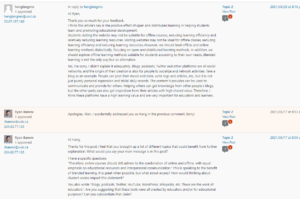Showcase Post (Topic 2)
In Topic2, I realized the positive role of open and distributed learning in helping students learn and promoting education development.
We are in an information age, and I find that open and distributed learning is not just dependent on technology, but an independent education platform, which makes its existence more human. Blogs, podcasts, Twitter, YouTube, WordPress, Wikipedia, etc., are social networks, and their origins are for people to socialize and network. Take blogs for example; people can publish moods and status, write logs and articles, etc., but it is not just a record of pure trivia, but for communication and to provide help to others, it has a high sharing value. At the same time, students can also obtain a large number of high-quality learning resources, effectively improve personal skills, accumulate experience and lessons, social practice and knowledge.
The article, Teaching Online: A Guide to Theory, Research, and Practice, presented by Claire Howell Major, discusses in depth the importance of educational approaches in open and distributed learning, but I think Major ignores the shortcomings of online courses. As argued in 25 Years of EDTech (Weller, 2021), personalized learning can provide more interactive teaching and a lack of emotional communication, which can easily eliminate students’ thinking process. We can get this explanation from Topic 1, personalized learning at the autonomous level has shortcomings; it is easy to block the communication between teachers and students. In Pedagogy, we should think critically about education.
However, considering the fact that students need to visit the web, visiting may not be suitable for offline courses and may reduce learning efficiency. Therefore, I think we should explore our own learning methods on the premise of open and distributed learning while combining online and offline learning methods. This is consistent with the idea of mixed education in Topic1 reading,Ethical challenges of edtech, big data and personalized learning: twenty-first century student sorting and tracking (Regan & Jesse, 2018). While these principles have served higher education well in directing attention to good teaching and learning practices, we believe they need to be updated to meet the changing needs of higher education.
If I am a teacher, I would like to increase student autonomy in an open, distributed teaching process and let students learn as much as possible. Then the teacher explains and summarizes the students’ homework. I will act as the mainline guide. Students and teachers collaborate in practice to create, update and improve open educational resources in the learning process.
I believe that education technology is the trend of the future. The combination of open distributed learning and educational technology will promote the development of higher quality education. For the future of education, it is challenging to rely on technology to achieve breakthroughs. Instead, it requires a deeper collaboration among educators, universities and learners, an open and distributed integration that promotes each other and better serves the development of students.
Description of the changes and additions
In this Showcase article, I have a deeper understanding of social platforms and illustrate the educational role of the platform by taking blogs as an example. while discussing the pros and cons of personalized learning, I used topIC1 materials and looked at the problem from a critical point of view. Moreover, considering the fact that students need to access the server, I turned to the topic1’s idea of hybrid education to update the existing education methods to serve the ever-changing higher education.
Screenshot (comments)

Reference page: https://henglang.opened.ca/reference-page-%ef%bc%88showcase-post%ef%bc%89/
Original Post:https://henglang.opened.ca/topic-2/
Reference:
Major, C. H. (2015). eaching online : a guide to theory, research, and practice. Teaching online : a guide to theory, research, and practice. https://www.worldcat.org/title/teaching-online-a-guide-to-theory-research-and-practice/oclc/904212181.
Regan, P. M., & Jesse, J. (2018, December 3). Ethical challenges of edtech, big data and PERSONALIZED learning: Twenty-first century STUDENT sorting and tracking. Ethics and Information Technology. https://link.springer.com/article/10.1007/s10676-018-9492-2.
Weller, M. (2021, August 11). 25 years of ed tech. Athabasca University Press. https://doi.org/10.15215/aupress/9781771993050.01.
Leave a Reply